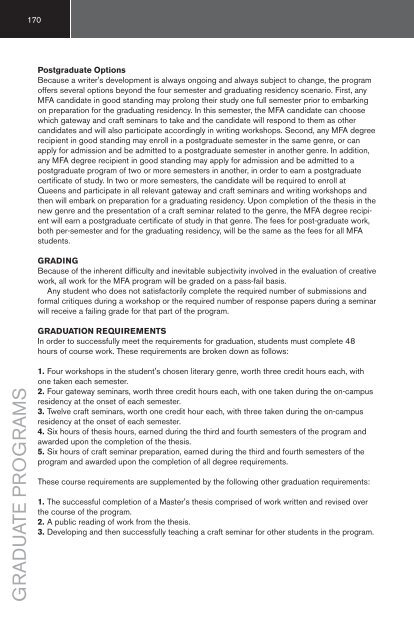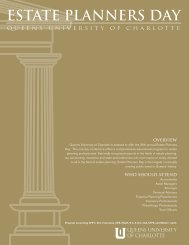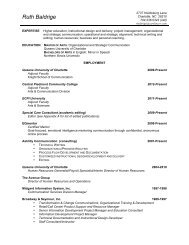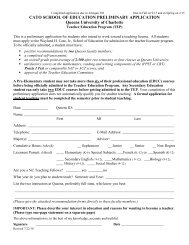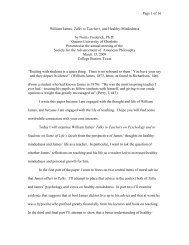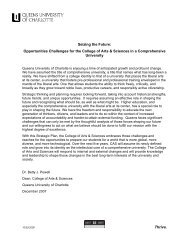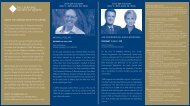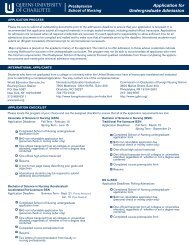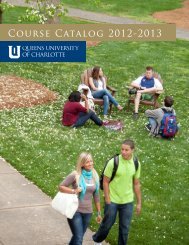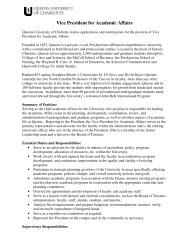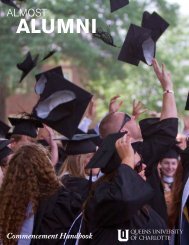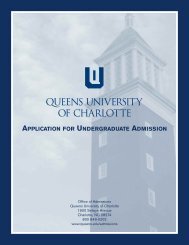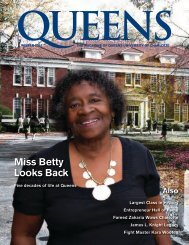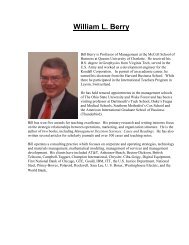- Page 1 and 2:
CATALOG 2008-2009
- Page 3 and 4:
2 Table of Contents THE UNIVERSITY
- Page 5 and 6:
4 The University To Communicate wit
- Page 7 and 8:
6 Accreditations Queens University
- Page 9 and 10:
8 The School of Communication 2008-
- Page 11 and 12:
10 College, Catawba Valley Communit
- Page 13 and 14:
12 The Honor Code Queens University
- Page 15 and 16:
14 Stultz Building (1952), named fo
- Page 17 and 18:
16 THE UNIVERSITY Honor Association
- Page 19 and 20:
18 INTERNSHIPS AND CAREER PROGRAMS
- Page 21 and 22:
20 Information Technology Services
- Page 23 and 24:
22 Student Records Public Records (
- Page 25 and 26:
24 International Student Admission
- Page 27 and 28:
26 Admission to the Undergraduate P
- Page 29 and 30:
28 THE UNDERGRADUATE PROGRAM Intern
- Page 31 and 32:
THE UNDERGRADUATE PROGRAM 30
- Page 33 and 34:
32 General Education Requirements C
- Page 35 and 36:
34 Typically during the sophomore y
- Page 37 and 38:
36 DEGREES All candidates for the b
- Page 39 and 40:
38 PROGRAMS for ACADEMIC ENRICHMENT
- Page 41 and 42:
40 Study Tour Policies Queens’ po
- Page 43 and 44:
42 Summer Study The University offe
- Page 45 and 46:
44 ART DEPARTMENT The Department of
- Page 47 and 48:
46 ART 308 19th Century Art: The Ri
- Page 49 and 50:
48 Biology Major (BS) Requirements:
- Page 51 and 52:
50 THE UNDERGRADUATE PROGRAM PHYSIC
- Page 53 and 54:
52 CHEMISTRY DEPARTMENT The Chemist
- Page 55 and 56:
54 ENVIRONMENTAL CHEMISTRY CONCENTR
- Page 57 and 58:
56 THE UNDERGRADUATE PROGRAM Choose
- Page 59 and 60:
58 THEATRE CONCENTRATION DRAM 103 T
- Page 61 and 62:
60 ENVIRONMENTAL POLICY CONCENTRATI
- Page 63 and 64:
62 HISTORY DEPARTMENT History, draw
- Page 65 and 66:
64 ANCIENT HISTORY CONCENTRATION In
- Page 67 and 68:
66 THE UNDERGRADUATE PROGRAM MATHEM
- Page 69 and 70:
68 Concentrations Housed in the Mat
- Page 71 and 72:
70 Recitals All students preparing
- Page 73 and 74:
72 OR Plus: (for piano) MUSC 310 Co
- Page 75 and 76:
74 Plus: MUTH 131 Freshman Music Th
- Page 77 and 78:
76 THE UNDERGRADUATE PROGRAM RELG 3
- Page 79 and 80:
78 HIST 361 Ideas and Values in Con
- Page 81 and 82:
80 Asian Studies Track Choose four
- Page 83 and 84:
82 THE UNDERGRADUATE PROGRAM ECON 4
- Page 85 and 86:
84 THE UNDERGRADUATE PROGRAM Plus c
- Page 87 and 88:
86 THE McCOLL SCHOOL OF BUSINESS BU
- Page 89 and 90:
88 MARKETING CONCENTRATION BUSN 340
- Page 91 and 92:
90 THE UNDERGRADUATE PROGRAM The Nu
- Page 93 and 94:
92 THE UNDERGRADUATE PROGRAM Transi
- Page 95 and 96:
94 THE UNDERGRADUATE PROGRAM Requir
- Page 97 and 98:
96 COMMUNICATION MAJOR Requirements
- Page 99 and 100:
98 Choose 6 hours from: COMM 231 Fi
- Page 101 and 102:
100 MUSC 200 From Jazz to Rock 'n'
- Page 103 and 104:
102 THE UNDERGRADUATE PROGRAM HUMAN
- Page 105 and 106:
104 UNDERGRADUATE ACADEMIC POLICIES
- Page 107 and 108:
106 REGISTRATION A student should c
- Page 109 and 110:
108 Repeated Courses Some courses a
- Page 111 and 112:
110 UNDERGRADUATE ACADEMIC POLICIES
- Page 113 and 114:
112 Restrictions While on Probation
- Page 115 and 116:
114 HAYWORTH COLLEGE Campus Visits
- Page 117 and 118:
116 Major Program of Study Each stu
- Page 119 and 120: 118 FOUNDATION REQUIREMENTS A minim
- Page 121 and 122: 120 of positions are available arou
- Page 123 and 124: 122 HAYWORTH COLLEGE Choose a minim
- Page 125 and 126: 124 Two courses chosen from: HCSV 3
- Page 127 and 128: 126 HAYWORTH COLLEGE Plus choose at
- Page 129 and 130: 128 biology as well as their cultur
- Page 131 and 132: 130 THE PRESBYTERIAN SCHOOL OF NURS
- Page 133 and 134: 132 Nursing Major Requirements for
- Page 135 and 136: 134 *Electives 12-15 credit hours D
- Page 137 and 138: 136 Transition Points in the Teache
- Page 139 and 140: 138 Requirements for Secondary Educ
- Page 141 and 142: 140 HAYWORTH COLLEGE Retention in t
- Page 143 and 144: 142 EDUC 270 or EDUC 514 Educationa
- Page 145 and 146: 144 ACADEMIC POLICIES All Hayworth
- Page 147 and 148: 146 Honors at Graduation Summa cum
- Page 149 and 150: 148 ASSOCIATE OF SCIENCE IN NURSING
- Page 151 and 152: 150 ASSOCIATE OF SCIENCE IN NURSING
- Page 153 and 154: 152 ASSOCIATE OF SCIENCE IN NURSING
- Page 155 and 156: 154 ASSOCIATE OF SCIENCE IN NURSING
- Page 157 and 158: 156 ASSOCIATE OF SCIENCE IN NURSING
- Page 159 and 160: 158 UNIVERSITY STUDENT QUALIFICATIO
- Page 161 and 162: 160 Graduate Programs Queens Univer
- Page 163 and 164: 162 GRADUATE ACADEMIC POLICIES TRAN
- Page 165 and 166: 164 Incomplete Status A faculty mem
- Page 167 and 168: 166 GRADUATE ACADEMIC POLICIES GRAD
- Page 169: 168 ADMISSION REQUIREMENTS In order
- Page 173 and 174: 172 GRADUATE PROGRAMS Elizabeth Eva
- Page 175 and 176: 174 David Payne is the author of fi
- Page 177 and 178: 176 The McColl School of Business T
- Page 179 and 180: 178 Transient status Transient stat
- Page 181 and 182: 180 General Electives - 9 credit ho
- Page 183 and 184: 182 International students Internat
- Page 185 and 186: 184 Master of Science in Organizati
- Page 187 and 188: 186 Applicants must also provide:
- Page 189 and 190: 188 GRADUATE PROGRAMS STUDENT STATU
- Page 191 and 192: 190 Graduate Certificate Programs i
- Page 193 and 194: 192 STATE-MANDATED TESTS Elementary
- Page 195 and 196: 194 ADMISSION to the MAT Program Ap
- Page 197 and 198: 196 PHASE I The course of study for
- Page 199 and 200: 198 DEGREE REQUIREMENTS FOR THE M.E
- Page 201 and 202: 200 STUDENT STATUS Full Graduate St
- Page 203 and 204: GRADUATE PROGRAMS 202
- Page 205 and 206: 204 UNDERGRADUATE COURSE DESCRIPTIO
- Page 207 and 208: 206 ART ART 101 Introduction to Art
- Page 209 and 210: 208 ART 315 20th and 21st Century A
- Page 211 and 212: 210 UNDERGRADUATE COURSE DESCRIPTIO
- Page 213 and 214: 212 BIOL 470 Biological Investigati
- Page 215 and 216: 214 BUSN 420 International Business
- Page 217 and 218: 216 BUSN 492 Topics in Business Thi
- Page 219 and 220: 218 CHEM 309L Physical Chemistry II
- Page 221 and 222:
220 UNDERGRADUATE COURSE DESCRIPTIO
- Page 223 and 224:
222 COMM 305 Organizational Communi
- Page 225 and 226:
224 COMM 353 “We interrupt this B
- Page 227 and 228:
226 DRAM 231 Film History and Critc
- Page 229 and 230:
228 ECON 300 Topics in Economics Th
- Page 231 and 232:
230 EDUC 352 Topics in Education In
- Page 233 and 234:
232 UNDERGRADUATE COURSE DESCRIPTIO
- Page 235 and 236:
234 UNDERGRADUATE COURSE DESCRIPTIO
- Page 237 and 238:
236 ENGL 455 Independent Study: Dra
- Page 239 and 240:
238 ENVR 490 Senior Project This co
- Page 241 and 242:
240 UNDERGRADUATE COURSE DESCRIPTIO
- Page 243 and 244:
242 UNDERGRADUATE COURSE DESCRIPTIO
- Page 245 and 246:
244 UNDERGRADUATE COURSE DESCRIPTIO
- Page 247 and 248:
246 HIST 391 Topics in World Histor
- Page 249 and 250:
248 IDST 450 Interdiscipline Senior
- Page 251 and 252:
250 INTS 450 Projects in Internatio
- Page 253 and 254:
252 UNDERGRADUATE COURSE DESCRIPTIO
- Page 255 and 256:
254 UNDERGRADUATE COURSE DESCRIPTIO
- Page 257 and 258:
256 MUSC 165 Guitar Class Two weekl
- Page 259 and 260:
258 UNDERGRADUATE COURSE DESCRIPTIO
- Page 261 and 262:
260 UNDERGRADUATE COURSE DESCRIPTIO
- Page 263 and 264:
262 UNDERGRADUATE COURSE DESCRIPTIO
- Page 265 and 266:
264 UNDERGRADUATE COURSE DESCRIPTIO
- Page 267 and 268:
266 UNDERGRADUATE COURSE DESCRIPTIO
- Page 269 and 270:
268 UNDERGRADUATE COURSE DESCRIPTIO
- Page 271 and 272:
270 UNDERGRADUATE COURSE DESCRIPTIO
- Page 273 and 274:
272 NURS 354 Nursing Perspectives I
- Page 275 and 276:
274 ORGANIZATIONAL COMMUNICATION OC
- Page 277 and 278:
276 UNDERGRADUATE COURSE DESCRIPTIO
- Page 279 and 280:
278 PHED 151 Beginning/Advanced Beg
- Page 281 and 282:
280 UNDERGRADUATE COURSE DESCRIPTIO
- Page 283 and 284:
282 POLS 300 Current Topics in Poli
- Page 285 and 286:
284 UNDERGRADUATE COURSE DESCRIPTIO
- Page 287 and 288:
286 UNDERGRADUATE COURSE DESCRIPTIO
- Page 289 and 290:
288 PSYC 449 Independent Research O
- Page 291 and 292:
290 UNDERGRADUATE COURSE DESCRIPTIO
- Page 293 and 294:
292 UNDERGRADUATE COURSE DESCRIPTIO
- Page 295 and 296:
294 Graduate Courses BIOLOGY BIOL 5
- Page 297 and 298:
296 GRADUATE COURSE DESCRIPTIONS BU
- Page 299 and 300:
298 BUSN 671 Seminar in Financial M
- Page 301 and 302:
300 GRADUATE COURSE DESCRIPTIONS ED
- Page 303 and 304:
302 EDUC 533 Science Methods/Materi
- Page 305 and 306:
304 EDUC 680 Action Research Examin
- Page 307 and 308:
306 NURS 624 Health Policy This cou
- Page 309 and 310:
308 OCOM 618 Gender and Diversity i
- Page 311 and 312:
310 OCOM 645 Advanced Coaching Theo
- Page 313 and 314:
312 Tuition and Fees While the Boar
- Page 315 and 316:
314 Telephone/cable/internet access
- Page 317 and 318:
316 Professional Golf Management Fe
- Page 319 and 320:
318 For Students in the Traditional
- Page 321 and 322:
320 Tuition, Room and Board Adjustm
- Page 323 and 324:
322 Federal Stafford Student Loans
- Page 325 and 326:
324 TUITION AND FEES QUEENS UNIVERS
- Page 327 and 328:
326 McColl School MBA Fellowships a
- Page 329 and 330:
328 TUITION AND FEES STUDY ABROAD S
- Page 331 and 332:
330 ADMINISTRATION BOARD OF TRUSTEE
- Page 333 and 334:
332 FACULTY FACULTY 2008-2009 Date
- Page 335 and 336:
334 FACULTY M. Cherie Clark Charles
- Page 337 and 338:
336 Nilofar Halsted Assistant Profe
- Page 339 and 340:
338 Joanna Mantis Instructor of Bio
- Page 341 and 342:
340 FACULTY Tracy Ann Petleski Inst
- Page 343 and 344:
342 FACULTY FACULTY EMERITI Florape
- Page 345 and 346:
344 APPENDIX I Title II of the High
- Page 347 and 348:
346 APPENDIX II Important Dates fro
- Page 349 and 350:
348 The student should put his or h
- Page 351 and 352:
350 INDEX College Level Examination
- Page 353 and 354:
352 Environmental Science Major, 58
- Page 355 and 356:
354 INDEX O Organization Developmen
- Page 357 and 358:
356 Campus Map CAMPUS MAP Queens bu
- Page 359 and 360:
358


